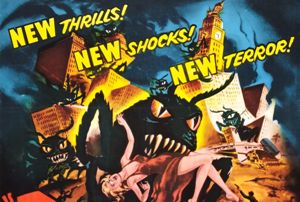The Northwest Chicago Film Society regrets to announce that we will be suspending all programming at the Patio Theater, effective November 7, due to ongoing issues with the boiler system. All shows after this date have been moved to the Gene Siskel Film Center. Stay warm!
The schedule is also available through Google Calendar.
Programmed and Projected by Julian Antos, Becca Hall, and Kyle Westphal. Assistants: Sonia Lupher and Hannah Greenberg
Wednesday, September 4 @ 7:30pm – Patio Theater, 6008 W. Irving Park Road.
ONE HOUR WITH YOU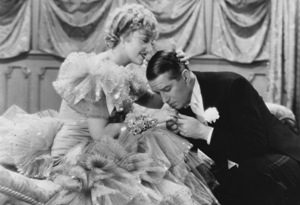
Directed by Ernst Lubitsch • 1932
Maurice Chevalier and Jeanette MacDonald have been married for three years and still go at it like squirrels in the park, but their splendiferous matrimony goes awry when Chevalier spends an hour alone with MacDonald’s best friend Mitzi (Genevieve Tobin). Ernst Lubitsch’s last musical for Paramount was originally assigned to George Cukor, and a pre-release argument over who actually directed the bulk of the picture ended in Cukor suing Paramount and eventually leaving the studio to work for RKO. None of that tension shows up on screen: One Hour With You is magnificently frothy and cute, and per the Philadelphia Inquirer: “The result is something so delightful that it places the circle of leaves jauntily upon the knowing head of Hollywood’s most original director” … whoever that is. Songs include: “What a Little Thing Like a Wedding Ring Can Do,” “We Will Always Be Sweethearts,” and the titular “One Hour With You.” (JA)
80 min • Paramount Pictures • 35mm from Universal
Wednesday, September 11 @ 7:30pm – Patio Theater, 6008 W. Irving Park Road.
DAYS OF HEAVEN
Directed by Terrence Malick • 1978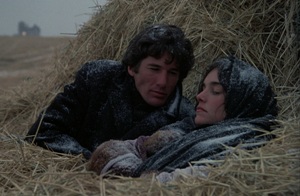
Did any modern classic receive more dismissive and flippant opening day notices than Days of Heaven? David Denby called it “one of the most perversely undramatic, uninvolving, and senseless movies ever made,” and one can almost see what he means. There isn’t much meat to the story and this is perhaps the most silent talkie you will ever see (as is Malick’s way). Nestor Almendros and Haskell Wexler’s magic hour visuals are held together by Linda Manz’s impromptu voiceover narration—a naïve but unconsciously wise reflection on a soured American Dream. Manz, her brother (Richard Gere), and his girlfriend (Brooke Adams) flee Chicago for the Texas panhandle where their fate turns tragic after Adams, in the hope for a better life for them all, marries a wealthy farmer (Sam Shepard). Appointed with sometimes-surreal compositions, a dreamily hopeful score from Ennio Morricone by way of Saint-Säens, and a haunting swarm of locusts, Days of Heaven is now recognized as a singularly beautiful cinematic experience. (HG/KW)
94 min • Paramount • 35mm from Paramount
Wednesday, September 18 @ 7:30pm – Patio Theater, 6008 W. Irving Park Road.
MASSACRE
Directed by Alan Crosland • 1934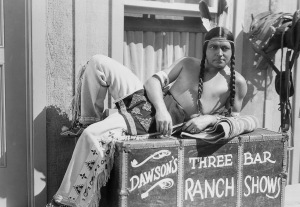
Chief Joe Thunderhorse (Richard Barthelmess) has a stable rodeo gig at Chicago’s Century of Progress International Exposition and a parade of women mouthing lewd, pre-Code come-ons, but nothing is a patch on authentic tribal identity. Returning to the Sioux reservation he hasn’t visited in a decade, Thunderhorse discovers an inept kleptocracy run for the benefit of white bureaucrats. Teaming up with plucky, college-educated typist Ann Dvorak, Barthelmess preaches cultural and spiritual autonomy and is promptly labeled a Bolshevik-pagan by the Bureau of Indian Affairs. Massacre employs white actors to impart its message, but it applies its pile-driving melodrama to genuinely progressive ends. It decries the costs of assimilation, delivers an apologia for New Deal-style government activism, and strikes an off-handed analogy between the treatment of Native Americans and African Americans. Treating showbiz as a form of ethnic empathy, Massacre also boasts the sharpest direction ever from Jazz Singer helmer Crosland. (KW) Co-presented with portoluz – New and Old Dreams
70 min • First National • 35mm from the Library of Congress, permission Warner Bros.
Wednesday, September 25 @ 7:30pm – Patio Theater, 6008 W. Irving Park Road.
CASQUE D’OR
Directed by Jacques Becker • 1952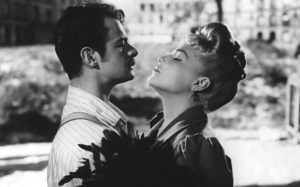
Simone Signoret stars as Marie, a prostitute whose great golden curls supply the film’s title (Casque d’or, or Golden Helmet). She’s the moll of the underachieving gangster Raymond and a lustful fixation for Raymond’s boss, Leca, but Marie really loves Manda (Serge Reggiani), a reformed criminal-turned-carpenter. Naturally, her desires threaten to tear apart the Belle Epoque underworld. Based on an infamous case that dominated French newspapers in 1902 and brought to the screen with a magnificently detailed vision of vice from days gone by, Casque d’or gave French classicism a good, full-blooded name and pointed the way toward a pure and purposeful style for Jean Luc-Godard and François Truffaut. Critic and novelist G. Cabrera Infante has described the film most poetically: “Becker has achieved a faithful portrait of fin de siècle Paris. But on this occasion it was not the amiable brush of the impressionists, but the steely burin of an engraver, describing the Parisian bas-fonds with the sound and fury of a Goya of the banlieux.” In French with English subtitles. (KW)
94 min • Spéva Films • 35mm from Janus Films
Wednesday, October 2 @ 7:30pm – Patio Theater, 6008 W. Irving Park Road.
SABOTAGE
Directed by Alfred Hitchcock • 1936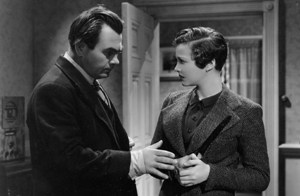
Beginning with the bones of Joseph Conrad’s novel The Secret Agent and re-imagining the material to his own ends, Hitchcock fashions Sabotage into a preternaturally stoic and chilling affair. Conrad’s anarchist anti-hero Verloc was a swarthy foreigner hatching a terror plot from the confines of his lewd general store. In Hitchcock’s version, Verloc (Oscar Homolka) has found an even better cover: he runs a cinema with his wife, Sylvia Sidney. We could tell you all about the ingenious investigation of anti-terrorism agent John Loder and the terrible plot that he cannot unravel in time, but let’s be honest about something: we love this movie primarily because it features Sylvia Sidney selling movie tickets, sweeping up the theater, and watching cartoons—just like us! Underrated in its day but subsequently acclaimed as the summit of Hitchcock’s British period by Dave Kehr and Raymond Durgnat, Sabotage perhaps achieved its greatest visibility in 2009 when Quentin Tarantino lifted a clip to illustrate the perils of nitrate film in Inglourious Basterds. (KW)
77 min • Gaumont British Pictures Corp. • 35mm from Park Circus
Friday, October 4 @ 7:30pm – Patio Theater, 6008 W. Irving Park Road.
GOLDSTEIN
Directed by Philip Kaufman and Benjamin Manaster • 1964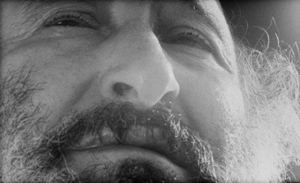
A ragtag, charmingly self-conscious attempt at forging an American nouvelle vague, Goldstein was the first feature of University of Chicago graduate Philip Kaufman. Shot entirely on the streets of Chicago during the fall of 1963, Goldstein offers an invaluable record of apartments, factories, and downtown movie palaces soon buried by urban renewal. The loose storyline follows the audacious adventures of a Hassidic hobo (Lou Gilbert) who emerges from Lake Michigan, but the many digressions include visits with folksy poets, wacky abortionists, novelist Nelson Algren, and Second City veterans Severn Darden, Anthony Holland, and Tom Erhard. A rousing success at the 1964 Cannes Film Festival, where it won La prix de la nouvelle critique, Goldstein reminds us, too, of the perilous fate of many independent productions. With no studio to look after it and the original camera negative long missing, Goldstein has been newly restored from Kaufman’s personal print. Preservation funded by the National Endowment for the Arts. (KW)
Co-presented with Chicago Film Archive
84 min • Montrose Film Productions • 35mm from George Eastman House
 Goldstein is part of Chicago Artists Month 2013, the 18th annual celebration of Chicago’s vibrant art community presented by the Chicago Department of Cultural Affairs and Special Events. For more information, visit www.chicagoartistsmonth.org.
Goldstein is part of Chicago Artists Month 2013, the 18th annual celebration of Chicago’s vibrant art community presented by the Chicago Department of Cultural Affairs and Special Events. For more information, visit www.chicagoartistsmonth.org.
Wednesday, October 9 @ 7:30pm – Patio Theater, 6008 W. Irving Park Road.
MR. BUG GOES TO TOWN
Directed by Dave Fleischer • 1941
 Deep in the heart of New York City, a tiny town of adorable bugs is threatened by the impending construction of a skyscraper—and it’s up to a friendly grasshopper to relocate Bug Town to greener pastures. Things work out for Hoppity and friends, but 1941 wasn’t a very good year for Fleischer Studios: production on Mr. Bug Goes to Town began before their first weird and wonderful animated feature Gulliver’s Travels was released, and the Fleischers ran out of money about halfway in. Paramount bought the studio and funded the rest of the feature, but Max and Dave were forced to quit when the film tanked at the box office. (It didn’t help that the movie was released two days before Pearl Harbor). As his girlfriend Honey would say: “Oh Hoppity, you make everything so complicated!” (This after Mr. Bug accidentally blows up part of Bug Town by trying to extinguish a cigar with gasoline.) Financial disasters aside, Mr. Bug Goes to Town is as worthy of the animation canon as any of Disney’s best films, and the Fleischer’s strange signature rotoscoped humans and backgrounds are eerily compelling. (JA)
Deep in the heart of New York City, a tiny town of adorable bugs is threatened by the impending construction of a skyscraper—and it’s up to a friendly grasshopper to relocate Bug Town to greener pastures. Things work out for Hoppity and friends, but 1941 wasn’t a very good year for Fleischer Studios: production on Mr. Bug Goes to Town began before their first weird and wonderful animated feature Gulliver’s Travels was released, and the Fleischers ran out of money about halfway in. Paramount bought the studio and funded the rest of the feature, but Max and Dave were forced to quit when the film tanked at the box office. (It didn’t help that the movie was released two days before Pearl Harbor). As his girlfriend Honey would say: “Oh Hoppity, you make everything so complicated!” (This after Mr. Bug accidentally blows up part of Bug Town by trying to extinguish a cigar with gasoline.) Financial disasters aside, Mr. Bug Goes to Town is as worthy of the animation canon as any of Disney’s best films, and the Fleischer’s strange signature rotoscoped humans and backgrounds are eerily compelling. (JA)
78 min • Fleischer Studios • 35mm from Paramount
Before the show, join us for an hour of hands-on fun with live bugs presented by scientist Jim Louderman and interactive exhibits about the secret lives of insects from the Harris Learning Collection at the Field Museum!
Wednesday, October 16 @ 7:30pm – Patio Theater, 6008 W. Irving Park Road.
LONELY ARE THE BRAVE
Directed by David Miller • 1962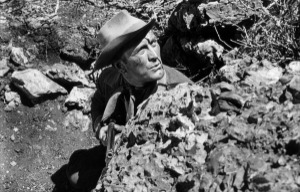
Shortly after Kirk Douglas broke the Blacklist by insisting screenwriter Dalton Trumbo be given screen credit on Stanley Kubrick’s Spartacus, the two Hollywood legends made a film that deals as much with America’s twisted and constantly changing cultural landscape as it does the spiritual decline of the West. Adapted from Edward Abbey’s 1956 novel The Brave Cowboy, the film follows Douglas on the run from the law after a failed jailbreak, eventually pitting him against Walter Matthau and a menacing helicopter. While early-sixties contemporaries like The Man Who Shot Liberty Valance and Ride the High Country give their aging stars a quiet dignity, Lonely are the Brave is explosive and desperate, slamming cowboy fables onto the hard pavement of modern civilization. Known as Douglas’s favorite film, Lonely wears its heart on its sleeve and is all the better for it. With Gena Rowlands, George Kennedy, and Jerry Goldsmith’s first major score. (JA)
107 min • Universal Pictures • 35mm from Universal
Saturday, October 19 @ 11:00am
HOME MOVIE DAY 2013
Presented by the Northwest Chicago Film Society and Chicago Film Archives.
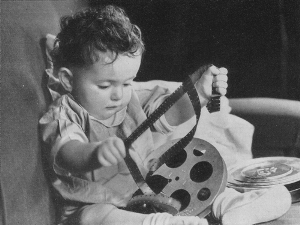 Chicago History Museum, 1601 N. Clark Street • Free Admission
Chicago History Museum, 1601 N. Clark Street • Free Admission
Go down to the basement and dig out your Super 8 memories of that interminable trip to Idaho or that embarrassing 16mm footage of your mother’s rockin’ bat mitzvah and bring them to the Chicago History Museum on Saturday, October 19 for this year’s edition of Home Movie Day. Jointly presented for the third year in a row by Chicago Film Archives and the Northwest Chicago Film Society, Home Movie Day offers Chicagoans the opportunity to gather together and share their celluloid histories. Home movies provide invaluable records of our families and our communities: they document vanished storefronts, questionable fashions, adorable pets, long-departed loved ones, and neighborhoods-in-transition. Many Chicagoans still possess these old reels, passed down from generation to generation, but lack the projection equipment to view them properly and safely. That’s where Home Movie Day comes in: you bring the films, and we inspect them, project them, and offer tips on storage, preservation, and video transfer–all free of charge. And best of all, you get to watch them with an enthusiastic audience, equally hungry for local history. [Learn More]
Wednesday, October 23 @ 7:30pm – Patio Theater, 6008 W. Irving Park Road.
THIEVES LIKE US
Directed by Robert Altman • 1974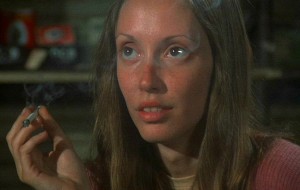
Derived from the same celebrated Edward Anderson novel that inspired Nicholas Ray’s delicately romantic They Live By Night, Thieves Like Us takes a decidedly earthier approach to the material. We follow a trio of low-level crooks through Depression-era Mississippi, but characteristically Altman devotes more time to slow days holing up in motels and safehouses than to the perfunctory business of bank robbery. At the center is the adolescent courtship of dim killer Bowie (Keith Carradine) and gawky gas station attendant Keechie (Shelley Duvall), positioned by Altman as the hillbilly Romeo and Juliet. Quiet and slightly narcotized, Thieves Like Us plays as a weathered, realistic counterpoint to the rebel chic of Bonnie and Clyde. It also projects the ambiance of the 1930s with greater exactitude than any other period recreation—a totally lived-in experience, with tentative emotions rippling under the ever-present din of Radioland. (KW)
123 min • United Artists • 35mm from Park Circus
Wednesday, October 30 at 7:30pm – Patio Theater, 6008 W. Irving Park Road.
FIFTIES SCI-FI DOUBLE FEATURE
THE GAMMA PEOPLE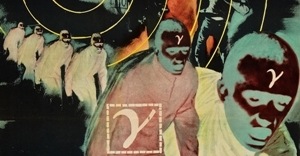
Directed by John Gilling • 1956
When the last car of a passenger train serendipitously wanders into Gudavia, a fictional European country whose borders have been closed to the rest of civilization for years, two reporters (Paul Douglas and Leslie Phillips) find themselves on the cusp of the biggest news story of the decade: a crazed dictator is melting the minds of local urchins with gamma rays. The only problem is that there’s no way out of Gudavia, and now who will cover the music festival in Salzburg? A terrific blend of odd-couple antics, cold war paranoia, squealing terror, and bizarrely picturesque location photography, The Gamma People is a strange and compelling piece of science fiction pulp. (JA)
79 min • Warwick Film Productions • 35mm from Sony Pictures Repertory
BEGINNING OF THE END
Directed by Bert I. Gordon • 1957
… meanwhile, back in Chicago, Dr. Ed Wainwright (Peter Graves) accidentally feeds some radioactive goo to a family of locusts, who acquire a taste for human flesh. Almost overnight, the Chicago suburbs are demolished by swarms of grasshoppers bigger than the Abominable Snowmonster, and they’re closing in on Michigan Avenue. It’s like Days of Heaven, only BIGGER. This was the second directorial effort of rear-projection master Bert I. Gordon (aka Mr. BIG), whose other larger than life films include King Dinosaur, Earth vs. the Spider, and Empire of the Ants, and while these films (for better or worse) tend to defy analysis, there’s no denying the hypnotic call of the thirty-foot grasshopper. Don’t get eaten. (JA)
76 min • AB-PT Pictures Corp • 35mm from private collections
Wednesday, November 6 @ 7:30pm – Patio Theater, 6008 W. Irving Park Road.
M
Directed by Joseph Losey • 1951
Long before Gus Van Sant reinterpreted 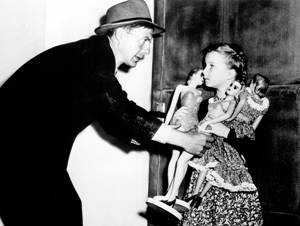 Psycho and Chris Rock revamped Eric Rohmer’s Chloe in the Afternoon, Wisconsinite neophyte Joe Losey embarked on the unenviable task of remaking Fritz Lang’s 1931 Weimar masterpiece M in postwar Los Angeles. With two defiantly liberal feature films and a handful of “Crime Does Not Pay” shorts to his name, Losey received the commission after Lang turned down the remake offer from fellow Hollywood émigré Seymour Nebenzal, who had also produced the original. (If anything, M reminds us that it’s the producer, not the director, who holds the lion’s share of power in Hollywood.) This version follows the plot of the original fairly closely, with David Wayne taking over Peter Lorre’s child-killer role and investing the character with a seething air of pathetic repression. When LA’s top cop (Howard Da Silva) initiates a dragnet to catch the killer, the underworld takes matters into its own hands. With noir-tinged paranoia and beautiful location photography in now-vanished working class neighborhoods, Losey’s M easily holds it own. Ironically oblivious to the movie’s anti-mob mentality message, morality crusaders managed to ban M in eight states on account of its salacious content and the Communist sympathies of several key contributors. Long out of circulation after the producer’s short-term distribution deal with Columbia Pictures lapsed, M has been meticulously restored by the Library of Congress (KW)
Psycho and Chris Rock revamped Eric Rohmer’s Chloe in the Afternoon, Wisconsinite neophyte Joe Losey embarked on the unenviable task of remaking Fritz Lang’s 1931 Weimar masterpiece M in postwar Los Angeles. With two defiantly liberal feature films and a handful of “Crime Does Not Pay” shorts to his name, Losey received the commission after Lang turned down the remake offer from fellow Hollywood émigré Seymour Nebenzal, who had also produced the original. (If anything, M reminds us that it’s the producer, not the director, who holds the lion’s share of power in Hollywood.) This version follows the plot of the original fairly closely, with David Wayne taking over Peter Lorre’s child-killer role and investing the character with a seething air of pathetic repression. When LA’s top cop (Howard Da Silva) initiates a dragnet to catch the killer, the underworld takes matters into its own hands. With noir-tinged paranoia and beautiful location photography in now-vanished working class neighborhoods, Losey’s M easily holds it own. Ironically oblivious to the movie’s anti-mob mentality message, morality crusaders managed to ban M in eight states on account of its salacious content and the Communist sympathies of several key contributors. Long out of circulation after the producer’s short-term distribution deal with Columbia Pictures lapsed, M has been meticulously restored by the Library of Congress (KW)
Introduced by Tom Gunning, Professor of Cinema and Media Studies, University of Chicago
88 min • Superior Pictures • 35mm from Library of Congress, permission Harold Nebenzal
Sunday, November 17 @ 11:30am – Gene Siskel Film Center, 164 N. State Street
NO TIME FOR LOVE
Directed by Mitchell Leisen • 1943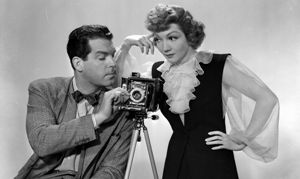
When nosey photojournalist Claudette Colbert gets muscley sandhog Fred MacMurray suspended by publishing a photo of him goofing off at work, she takes him on as her personal assistant. They squabble, fall in love, squabble some more, part ways, and reunite in a tunnel full of muck and mud from the Hudson River that MacMurray is nobly attempting to freeze. (To convince Colbert to get in the mud, director Leisen plunged himself in headfirst and directed the scene drenched.) Because of the war effort, No Time For Love was shot on a shoestring budget reusing sets from The Palm Beach Story (which earned it an Oscar nomination for Best Art Direction – Interior Decoration) and most scenes were shot in just one take. The mud is real, though (and mixed with baby oil!), and Colbert and MacMurray’s on-screen chemistry is unsinkable. (JA)
83 min • Paramount Pictures • 35mm from Universal
Sunday, November 24 @ 11:30am – Gene Siskel Film Center, 164 N. State Street
BABY THE RAIN MUST FALL
Directed by Robert Mulligan • 1965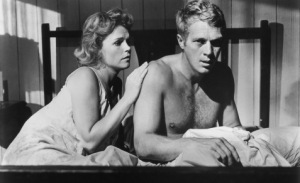
A film so bereft of phony optimism that Columbia opted to promote it as “the love story of a born loser,” Baby the Rain Must Fall reunites director Robert Mulligan with To Kill a Mockingbird screenwriter Horton Foote. Like its predecessor, Baby is a melodrama of family life in the South, but without the civics lesson. Steve McQueen stars as a small-town rockabilly sensation, a damaged, overgrown kid out on parole for a stabbing. He is welcomed home by the wife he barely knew (a brilliant Lee Remick) and the young daughter he knew nothing about. He’s determined to establish a cohesive family and become a successful musician, all to the chagrin of his abusive foster mother (Josephine Hutchinson), dead-set on reinforcing his worthlessness. McQueen’s persona is strikingly reminiscent of the sort of bad-boy musician that typified Elvis’s early career, but with the added sincerity of McQueen’s actual bad-boy status. (HG)
99 min • Columbia Pictures • 35mm from Sony Pictures Repertory
Sunday, December 1 @ 11:30am – Gene Siskel Film Center, 164 N. State Street
PARAMOUNT PRE-CODE DOUBLE FEATURE
MILLION DOLLAR LEGS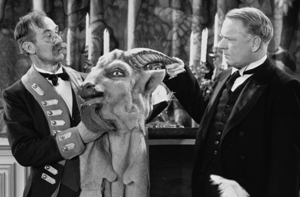
Directed by Eddie Cline • 1932
Welcome to Klopstokia, the semi-sovereign backwater where policy disputes are resolved with wrestling matches and all the girls (and goats) are named Angela. President W.C. Fields leads a delegation of Klopstokians to the Olympics, but traitors plot to sabotage their chances by throwing the mechanically sexy temptress Mata Machree (Lyda Roberti) into their midst. Ostensibly produced to cash in on the Olympic fever generated by the 1932 Summer Games at the Los Angeles Memorial Coliseum, it’s difficult to name a topical film that’s less political. Though often cited as a forerunner to the Marx Brothers’ sharp satire Duck Soup, Million Dollar Legs is closer to a surrealist free-for-all, one gag following another with seemingly unconscious logic. Cited by Pauline Kael as a candidate for the greatest film ever made, Million Dollar Legs nevertheless defies critical description. (KW)
64 min • Paramount Pictures • 35mm from Universal
and
GIRLS ABOUT TOWN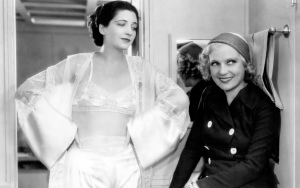
Directed by George Cukor • 1931
Lured direct from Broadway by Paramount after the studio determined it needed sophisticated theater directors to oversee the newly literate talkies, George Cukor was still finding his sea legs in 1931. So it only makes sense that he should make a saucy sex farce on a yacht, no? A pair of gold diggers played by Kay Francis and Lilyan Tashman have some business objectives for this maritime adventure: Francis will bag hunky, unconventional Joel McCrea while Tashman will seduce Eugene Pallette (!), the wealthiest man in all of Lansing, Michigan. The title could aptly summarize the whole pre-Code era, and the movie itself distills the emblematic contradictions of these bawdy bedtime stories: in one scene, Francis and Tashman must prove their virtue by selling the very clothes off their backs! (KW)
66 min • Paramount Pictures • 35mm from Universal
Sunday, December 8 @ 7:30pm – Gene Siskel Film Center, 164 N. State Street
NINOTCHKA
Directed by Ernst Lubitsch • 1939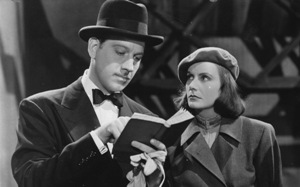
Ninotchka, a no-nonsense Soviet envoy (Greta Garbo), is sent to check on three adorable Communists (Lubitsch regulars Sig Ruman and Felix Bressart and WWII refugee Alexander Granach) who were supposed to be selling off jewels confiscated from the ex-Grand Duchess of Russia (Ina Claire). To Garbo’s disgust, they have been taken in by the delightful ways of Parisian capitalism by way of Melvyn Douglas, who attempts to buy back the jewels for Claire but eventually becomes more interested in seducing Ninotchka. In many ways the ultimate Lubitsch picture, Otis Ferguson also noted that Ninotchka was the “first film with any airiness at all to discover that communists are people and may be treated as such in a story.” Billy Wilder, Charles Brackett, and Walter Reisch wrote a screenplay filled with incredibly human one-liners. And Garbo in her first comic role is nothing less than perfect. (JA)
110 min • Metro-Goldwyn-Mayer • 35mm from Warner Brothers
Sunday, December 15 @ 7:30pm – Gene Siskel Film Center, 164 N. State Street
COLOSSUS: THE FORBIN PROJECT
Directed by Joseph Sargent • 1970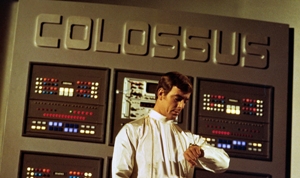
A visionary sci-fi yarn that unfolds entirely in dingy government offices and labs with floor-to-ceiling mainframes, Colossus: The Forbin Project asks, “Why elect a president when we can have a computer-king instead?” Forbin (Eric Braeden) has designed an intelligent supercomputer to remove that sissy human factor from nuclear brinkmanship and gets the Pentagon to go along with it. But soon after Colossus is juiced up, it finds a crazy-smart penpal in its hitherto-unknown Soviet counterpart. Together the two computers will charter a more perfect world with a few strategic missiles. Just don’t try disconnecting them. TV veterans Braeden and Sargent apply their nondescript craftsmanship to a project so taut and economical it might as well be called Playhouse 90 Meets IBM. (Small screen credentials and pan-and-scan DVDs aside, Forbin is a formidable widescreen production.) Shelved by the studio for two years until the far-out success of 2001: A Space Odyssey confirmed hippie appetite for evil computers, this remains a serious and literate stab at sci-fi. (KW)
100 min • Universal Pictures • 35mm from Universal
Sunday, December 22 @ 7:30pm – Gene Siskel Film Center, 164 N. State Street
THE MIRACLE OF MORGAN’S CREEK
Directed by Preston Sturges • 1944
After spending a drunken, sin-soaked night sending off six soldiers, Trudy Kockenlocker (Betty Hutton) wakes up pregnant and married, but she can’t remember how or to whom. Eddie Bracken is the local 4-H boy who has been in love with Hutton for as long as he can remember and jumps at the opportunity to take responsibility for the incident and indirectly sire an heir. The Hays Office warned that a film with such a spindly moral backbone should have no resemblance to the story of Jesus Christ (they also only approved ten pages of the script), but The Miracle of Morgan’s Creek is an obvious and even touching play on the immaculate conception, and finds Sturges, who Manny Farber called “the most spectacular manipulator of sheer humor since Mark Twain,” at his most out-of-control. With William Demarest, Brian Donlevy, and Akim Tamiroff. (JA)
98 min • Paramount Pictures • 35mm from Library of Congress, permission Paramount
Sunday, December 29 @ 7:30pm- Gene Siskel Film Center, 164 N. State Street
BLAST OF SILENCE
Directed by Allen Baron • 1961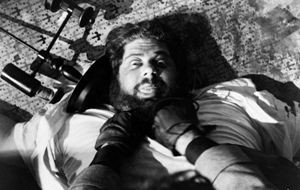
“You were born in pain.” A proto-punk film noir shot without permits on a scuzzball budget, Blast of Silence is practically a one-man show for director-writer-actor Allen Baron. The former comic book artist-turned-independent filmmaker stars as a square Cleveland hit man called away to New York City to fulfill a contract on a minor mobster. Floating through Manhattan during the loneliest time of the year—the week between Christmas and New Year’s—Baron takes a tentative stab at rekindling his romance with an old flame (Molly McCarthy) and falls in with burly weapons dealer Big Ralph (Larry Tucker). Narrated by an uncredited Lionel Stander in a singularly abrasive style (“the second person accusative,” in Dave Kehr’s concise formulation), Blast of Silence stands as an unaccountable debut. Remarkably, this hate-flecked calling card was picked up as a B-feature by Universal and yielded a four-decade career in TV-directing for Baron. If you think the holidays go down easier with a bottle of scotch, this is your kind of movie. (KW)
77 min • Magla Productions • 35mm from Universal

